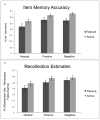A single bout of resistance exercise can enhance episodic memory performance
- PMID: 25262058
- PMCID: PMC4597774
- DOI: 10.1016/j.actpsy.2014.06.011
A single bout of resistance exercise can enhance episodic memory performance
Abstract
Acute aerobic exercise can be beneficial to episodic memory. This benefit may occur because exercise produces a similar physiological response as physical stressors. When administered during consolidation, acute stress, both physical and psychological, consistently enhances episodic memory, particularly memory for emotional materials. Here we investigated whether a single bout of resistance exercise performed during consolidation can produce episodic memory benefits 48 h later. We used a one-leg knee extension/flexion task for the resistance exercise. To assess the physiological response to the exercise, we measured salivary alpha amylase (a biomarker of central norepinephrine), heart rate, and blood pressure. To test emotional episodic memory, we used a remember-know recognition memory paradigm with equal numbers of positive, negative, and neutral IAPS images as stimuli. The group that performed the exercise, the active group, had higher overall recognition accuracy than the group that did not exercise, the passive group. We found a robust effect of valence across groups, with better performance on emotional items as compared to neutral items and no difference between positive and negative items. This effect changed based on the physiological response to the exercise. Within the active group, participants with a high physiological response to the exercise were impaired for neutral items as compared to participants with a low physiological response to the exercise. Our results demonstrate that a single bout of resistance exercise performed during consolidation can enhance episodic memory and that the effect of valence on memory depends on the physiological response to the exercise.
Keywords: Arousal; Emotion; Episodic memory; Exercise; Stress.
Copyright © 2014 Elsevier B.V. All rights reserved.
Figures




References
-
- Anderson-Hanley C, Arciero PJ, Brickman AM, Nimon JP, Okuma N, Westen SC, Merz ME, Pence BD, Woods JA, Kramer AF, Zimmerman EA. Exergaming and older adult cognition: a cluster randomized clinical trial. Am J Prev Med. 2012;42:109–119. - PubMed
-
- Bradley MM, Lang PJ. The International Affective Picture System (IAPS) in the study of emotion and attention. In: Coan JA, Allen JJB, editors. Handbook of Emotion Elicitation and Assessment. Oxford University Press; New York: 2007. pp. 29–46.
-
- Cadore EL, Izquierdo M, dos Santos MG, Martins JB, Rodrigues Lhullier FL, Pinto RS, Silva RF, Kruel LF. Hormonal responses to concurrent strength and endurance training with different exercise orders. J Strength Cond Res. 2012;26:3281–3288. - PubMed
-
- Cadore EL, Lhullier FLR, Brentano MA, Da Silva EM, Ambrosini MB, Spinelli R, Silva RF, Kruel LFM. Salivary hormonal responses to resistance exercise in trained and untrained middle-aged men. Journal of Sports Medicine and Physical Fitness. 2009;49:301–307. - PubMed
Publication types
MeSH terms
Substances
Grants and funding
LinkOut - more resources
Full Text Sources
Other Literature Sources

